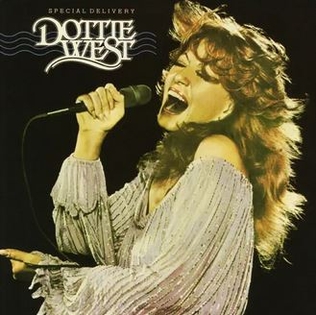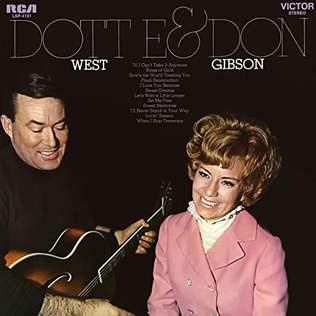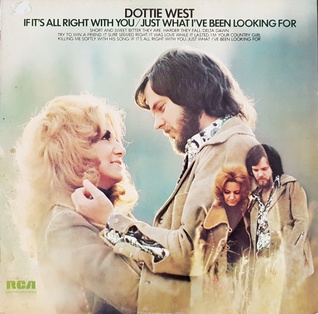Related Research Articles
"A Lesson in Leavin'", also titled as "Lesson in Leavin"', is a song written by Randy Goodrum and Brent Maher. It was originally recorded in 1980 by American country music singer, Dottie West, who brought the song to No. 1 on the Billboard Country Chart. In 1999, it was re-recorded by American country music singer, Jo Dee Messina, whose version spent seven weeks at No. 2 on the Billboard Country Chart. Messina recorded the song as a tribute to West who died in 1991.
"Here Comes My Baby" is a song co-written and recorded by American country music artist Dottie West. It was released in June 1964 as the first single and title track from the album Here Comes My Baby. West wrote the song with her then-husband Bill.

"What Are We Doin' in Love" is a song written by Randy Goodrum and recorded by American country music artists Dottie West and Kenny Rogers. It was released in March 1981 as the second single from the album Wild West. The song was West and Rogers' third and final number one on the country chart.

Special Delivery is the twenty-second solo studio album by American country artist, Dottie West. The album was released in 1979 on Liberty Records and was produced by Randy Goodrum and Brent Maher. The album came on the heels of two chart-topping West duet albums with Kenny Rogers and reestablished West as a major solo artist, becoming West's most successful solo album since 1967, thanks in part to three top 15 country hits on the collection, including "A Lesson in Leavin'", the first solo number one record in West's 20-year career.

"Last Time I Saw Him" is a 1973 single release by Diana Ross, being a composition by Michael Masser and lyricist Pam Sawyer: the track was produced by Masser and released in December 1973 at the same time as Ross' Last Time I Saw Him album.

Country Sunshine is a studio album by American country music artist Dottie West. It was released in November 1973 on RCA Victor Records. The album's ten tracks were produced by Billy Davis. Her 21st studio recording, Country Sunshine was released following the success of the title track. The song became a major hit after first being part of a Coca-Cola commercial. The album itself would reach major positions on national publication charts following its release.

Country Girl is a studio album by American country music artist Dottie West. It was released in August 1968 on RCA Victor Records and was produced by Chet Atkins. The project was West's ninth studio album and second to be released in 1968. The album consisted of 12 tracks, which contained new recordings and cover versions. The album's title track became a major hit in 1968 and would later be a signature song for West.

Dottie and Don is a studio album by American country music artists Don Gibson and Dottie West. It was released in March 1969 on RCA Victor Records and was produced by Chet Atkins and Danny Davis. The album was a collection of duet recordings between Gibson and West. It was both artists first album of duets to be recorded. Among the songs from the project, "Rings of Gold" became a major hit in 1969.
"City Lights" is an American country music song written by Bill Anderson on August 27, 1957. He recorded it on a small Texas label called TNT Records in early 1958 to little acclaim. The song was first cut by Anderson in 1957 at the campus of the University of Georgia. In June 1958, Ray Price recorded it and his version hit number 1 on the Billboard Hot Country Songs singles chart in August 1958. Mickey Gilley's version also hit number 1 in June 1975.
"I Love You Because" is a song written and recorded by country music singer and songwriter Leon Payne in 1949. The song has been covered by several artists throughout the years, including hit cover versions by Al Martino in 1963 and Jim Reeves in 1964.
"Till I Can't Take It Anymore" is a song written by Clyde Otis and Ulysses Burton. It was first recorded by Ben E King in 1968. The song was featured in The Soul Clan self-titled album "The Soul Clan". Dottie West and Don Gibson version charted at 46 on the Hot Country Songs in 1970. Since then, it has also charted as a single by Andra Willis, whose version went to number 85 on the same chart in 1973. Pal Rakes's version went to number 31 in 1977.
"Boogie Grass Band" is a song written by Ronnie Reno, and recorded by American country music artist Conway Twitty. It was released in July 1978 as the first single from his album Conway. The song peaked at number 2 on the Billboard Hot Country Singles chart. It also reached number 1 on the RPM Country Tracks chart in Canada.
"Rings of Gold" is a single by American country music artists Dottie West and Don Gibson. Released in February 1969, it was the first single from their album Dottie and Don. The song peaked at number 2 on the Billboard Hot Country Singles chart. It also reached number 1 on the RPM Country Tracks chart in Canada.

If It's All Right with You/Just What I've Been Looking For is a studio album by American country music artist Dottie West. It was released in May 1973 on RCA Victor Records and was produced by Jerry Bradley. The project was West's 20th studio recording in her music career. It consisted of ten tracks, two of which became minor hits on the country charts in 1973. The album's contemporary sound helped modernize West's music, bringing the album to chart on the Billboard country albums survey in 1973.

The singles discography of American country artist Dottie West contains 71 singles, 12 collaborative singles, 3 promotional singles and 1 other charting song. West signed with RCA Victor Records in 1963, having her first Top 40 hit the same year. It was followed in 1964 by "Love Is No Excuse", a duet with Jim Reeves that became West's first top 10 hit. In 1964, she also released "Here Comes My Baby". The song reached number 10 on the Billboard Hot Country Singles chart and became the first song by a female country artist to win a Grammy award. From her 1966 album, West issued four singles, including the top 10 hits "Would You Hold It Against Me" and "What's Come Over My Baby". Over the next two years she had major hits with "Paper Mansions", "Like a Fool", "Country Girl", and "Reno". In 1969, West collaborated with Don Gibson on "Rings of Gold", which reached number 2 on the Billboard country chart. In 1973, she released a single version of a commercial jingle originally used by The Coca-Cola Company. Entitled "Country Sunshine", the song became West's biggest hit, reaching number 2 on the country songs chart and number 49 on the Billboard Hot 100. The song also nominated her for her eleventh Grammy. After releasing the top 10 hit "Last Time I Saw Him" (1974), West's chart hits declined and she was dropped from RCA in 1976.
"Country Girl" is a song co-written and recorded by the American country music artist Dottie West. It was released in March 1968 as the first single and title track from the album Country Girl. The song peaked at number 15 on the Billboard Hot Country Singles chart. In addition, "Country Girl" was West's first song to enter the Canadian RPM Country chart, reaching a peak of number 5. West wrote the song with Red Lane.
"Come See Me and Come Lonely" is a song written by Red Lane, and recorded by American country music artist Dottie West. It was released in May 1978 as the first single from the album Dottie. The song peaked at number 17 on the Billboard Hot Country Singles chart. In addition, "Come See Me and Come Lonely" peaked at number 28 on the Canadian RPM Country chart. Later in the year, the single was released onto West's 1978 album entitled Dottie. It was the only single released from the album.
"Anyone Who Isn't Me Tonight" is a song written by Julie Didier and Casey Kelly, and recorded by American country music artists Kenny Rogers and Dottie West. It was released in August 1978 as the second single from the album Every Time Two Fools Collide. The song peaked at number 2 on the Billboard Hot Country Singles chart. The song also peaked at number 10 on the RPM Country Tracks chart that year.
"(I'm Gonna) Put You Back on the Rack" is a song written by Randy Goodrum and Brent Maher, and recorded by American country music artist Dottie West. The song peaked at number 16 on the Billboard Hot Country Singles chart. It was released in June 1981 as the third and final single from West's album Wild West. In addition, "(I'm Gonna) Put You Back on the Rack" peaked at number 22 on the Canadian RPM Country chart.

The albums discography of American country artist Dottie West contains 33 studio albums and 17 compilation albums. Among West's studio releases were five collaborative albums with various artists, including Kenny Rogers. After signing with RCA Victor Records in 1963, West released her debut studio album Here Comes My Baby (1965). The album peaked at number 12 on the Billboard Top Country Albums chart in July 1965. West's third studio album Suffer Time (1966) spawned four singles, including "Would You Hold It Against Me", a top 5 hit on the Billboard Hot Country Songs chart. Suffer Time would reach number 3 on the country albums chart, West's highest-charting solo album. Between 1967 and 1968, West released 5 more studio albums. With All My Heart and Soul (1967) featured the top 10 hit "Paper Mansions" and the album itself peaked at number 8 on the Top Country Albums list. In 1969, she paired with Don Gibson for her first collaborative project Dottie and Don. The album featured the pair's number 2 Billboard country hit "Rings of Gold". In 1970, she collaborated with Jimmy Dean on the studio release Country Boy and Country Girl. In 1973, West had her biggest hit with the single "Country Sunshine". Its corresponding album of the same name peaked at number 17 on the country album chart in February 1974.
References
- ↑ "Dottie West | Biography, Albums, Streaming Links | AllMusic". AllMusic. Retrieved 2017-04-14.
- ↑ Whitburn, Joel (2004). The Billboard Book Of Top 40 Country Hits: 1944-2006, Second edition. Record Research.
- ↑ "Search results for "Country Girl"". RPM . Retrieved 15 October 2012.
- ↑ "Dottie West Chart History (Hot Country Songs)". Billboard.
| | This 1960s country song-related article is a stub. You can help Wikipedia by expanding it. |